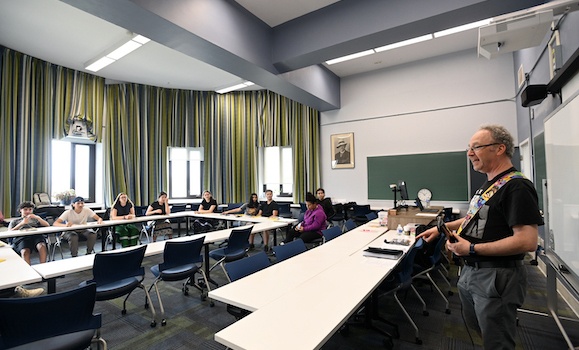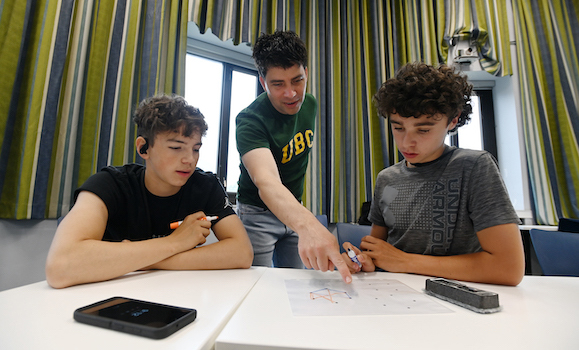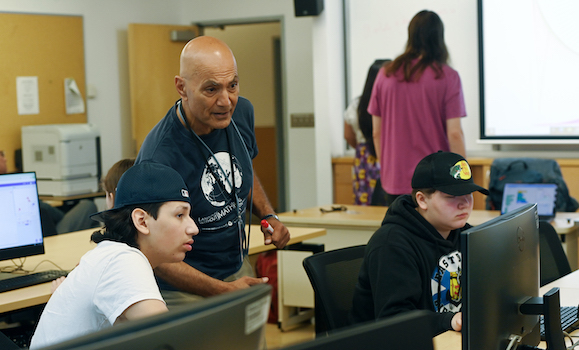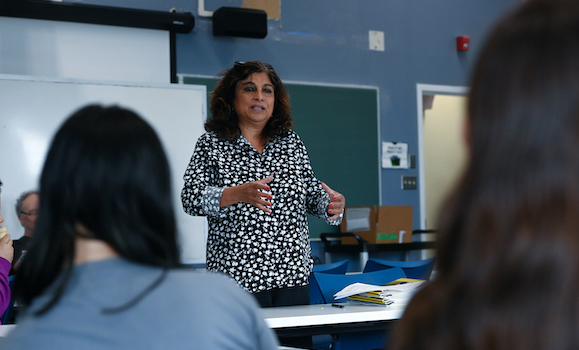If you heard a wailing electric guitar echoing through the halls of the Chase Building this week, it was, in fact, for educational purposes.┬Ā
A session led by Dr. Jason Brown, known for his┬Āresearch combining math and music, where participants played percussion instruments and ŌĆ£feltŌĆØ the mathematics in the rhythm was one of the activities in the inaugural Indigenous Math Camp, which saw 14 youth from MiŌĆÖkmaw communities throughout Nova Scotia arrive at ┬ķČ╣┤½├Į shortly after the National Indigenous Peoples Day on June 21.
Led by co-directors Dr. Brown of the Department of Mathematics and Statistics and Dr. Nauzer Kalyaniwalla of the Faculty of Computer Science, the five-day camp showcased the fun side of math and programming concepts and provided a taste of the campus experience. It built on the foundation established by the long-running Black EducatorsŌĆÖ Association (BEA) ŌĆō ┬ķČ╣┤½├Į Math Camp, which has brought African Nova Scotian youth to Dal for summer math and coding sessions for the past 30 years.
BEA camp founder Dr. Chelluri Sastri, a retired Dal math professor, was also eager to establish a camp for Indigenous students, but it took until a partnership with┬Ā, the organization which represents the educational interests of 12 MiŌĆÖkmaw communities in Nova Scotia, to get it up and running.┬Ā
ŌĆ£Indigenous students represent a completely underserved segment,ŌĆØ Dr. Kalyaniwalla says, estimating he has taught only a handful of Indigenous students in his computer science classes over the years.
Instructor Dr. Julien Ross leads campers through a workshop.
Experiencing life on campus
After checking into their LeMarchant Place residence rooms on Saturday with their chaperones, the students, aged 12-14, were welcomed to campus with an introduction from Elder Tom Christmas.┬Ā
During the camp, which ran from June 22-26, the students cycled through different workshops and activities led by faculty and grad student volunteers in the computer labs and classrooms of DalŌĆÖs Studley Campus. Dr. Brown led the math portion of the campŌĆÖs sessions, with Dr. Kalyaniwalla overseeing the computer science side of things, namely the introduction of Scratch, a programming language mainly used as an educational tool for youth.
ŌĆ£All the activities are very visual, very hands-on,ŌĆØ says Dr. Brown. ŌĆ£TheyŌĆÖre designed to get into the creative part of mathematics.ŌĆØ┬Ā
Dr. Nauzer Kalyaniwalla instructs campers on how to use the Scratch programming language.
Outside of the classroom, students made the most of their time on campus, taking in the┬ĀAlan Syliboy exhibition┬Āat the ┬ķČ╣┤½├Į Art Gallery, enjoying an evening of karaoke in the KoŌĆÖjua Okuom space in the Killam Library, and visiting the Indigenous Student Centre.
With a focus on fun, Dr. Brown hopes the inaugural group of campers enjoyed sampling the first-year university experience, living in residence and meeting peers from across the province, as well as gaining a further appreciation of math and computer science.
ŌĆ£I think theyŌĆÖre going to see that there is more math in their lives than they expected.ŌĆØ
Dr. Theresa Rajack-Talley, vice-provost, equity and inclusion, welcomes campers.
The Indigenous Math Camp was sponsored by MiŌĆÖkmaw KinaŌĆÖmatnewey, the Atlantic Association for Research in the Mathematical Sciences (AARMS), Chairs for Inclusion in Science and Engineering (CISE Atlantic), the Canadian Mathematical Society, the Faculty of Science, and the ┬ķČ╣┤½├Į PresidentŌĆÖs Office.




